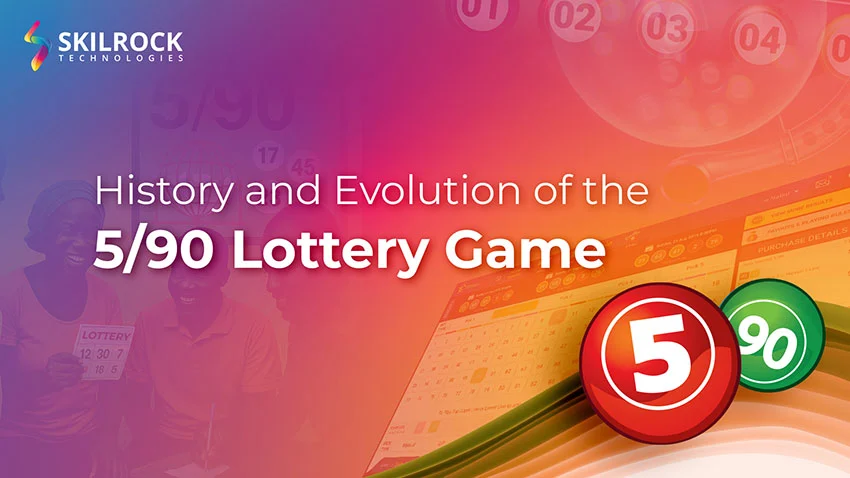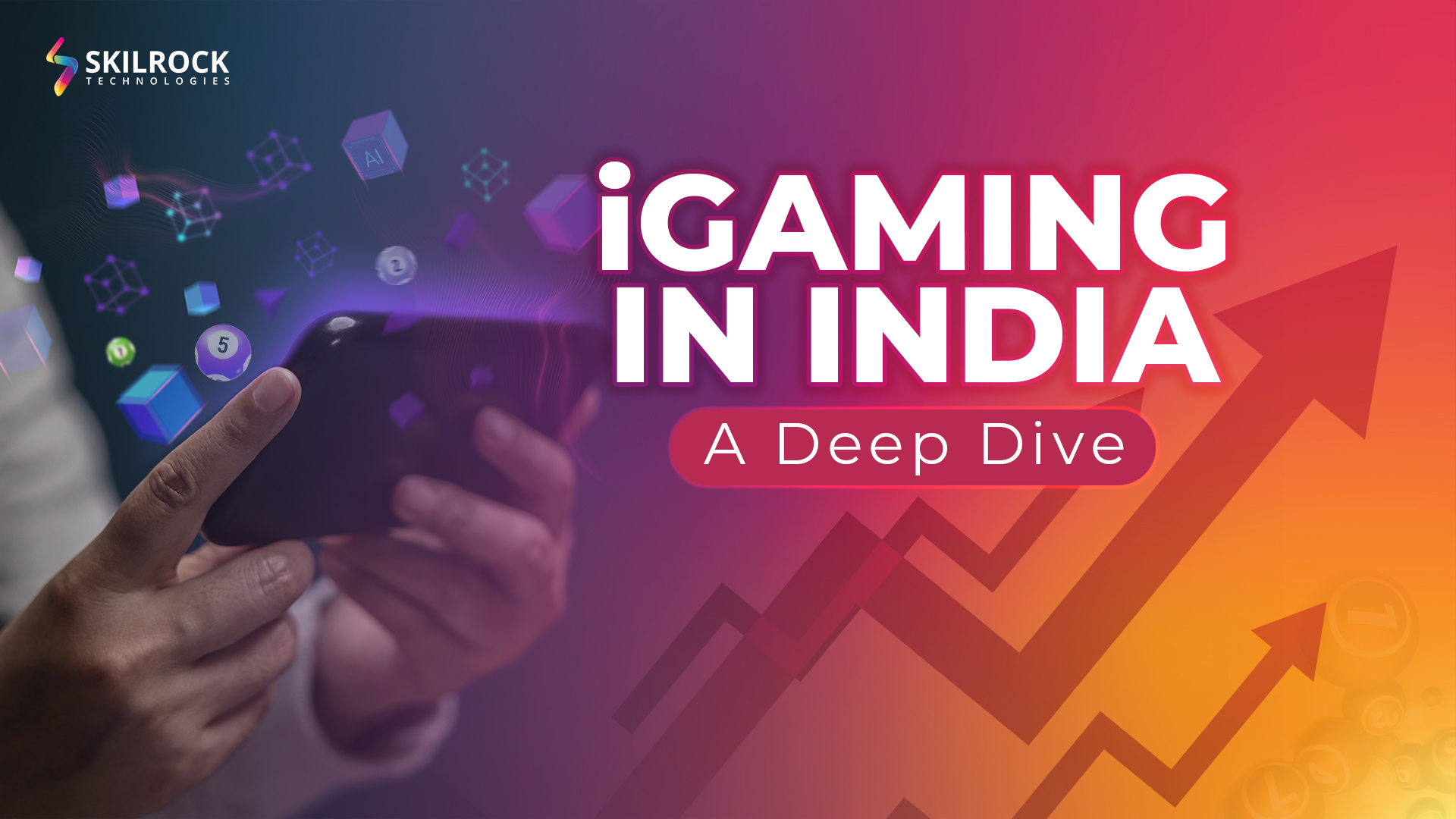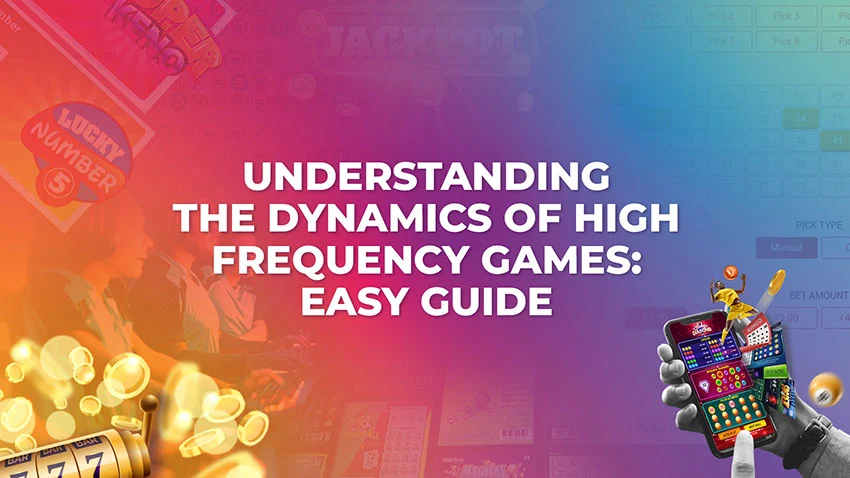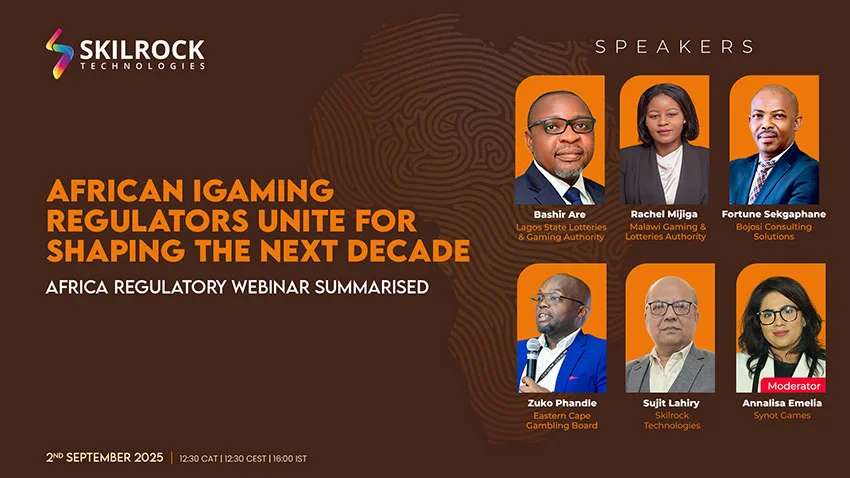History and Evolution of the 5/90 Lottery Game
Introduction: A Game of Numbers with Global Roots
The 5/90 lottery game is one of the most widely played number-based games in the world today, especially popular in Africa. Known for its simplicity, frequent draws, and the potential for life-changing wins, 5/90 is more than a numbers game. For millions, it is a daily ritual, an economic activity, and a cultural symbol.
Although many associate it primarily with the African continent, the 5/90 format has a much older and broader history. Its roots can be traced back to lottery systems in Europe. In modern times, digital innovation has brought the game to online platforms and mobile devices, extending its reach and reshaping how it is played.
Yet it's not longevity alone that makes 5/90 truly remarkable, but the seamlessness of its evolution. From its colonial-era roots to becoming a modern-day favorite, this game has mirrored the transformation of the societies that embraced it. It has influenced local economies, inspired belief systems around luck and destiny, and even shaped policy decisions in national lotteries.
This blog explores how 5/90 evolved from historical lottery formats to become one of the most iconic and deeply rooted games, especially in African communities.
What is the 5/90 Lottery Game?
The 5/90 lottery game is a fixed-odds numerical draw in which players select five numbers from a set ranging from 1 to 90. The objective is simple: match your selected numbers with the ones drawn during the official lottery to win a cash prize. The more numbers you match, the greater your winnings.
This format is widely regarded for its accessibility and appeal. With minimal stakes and the allure of substantial rewards, it attracts a broad demographic, from young hopefuls to elderly regulars. In many regions, there are multiple draws daily, offering players frequent opportunities to participate and win.
What sets 5/90 apart from other lotteries is the community it builds. From neighborhood betting kiosks to mobile platforms, it's not uncommon to see groups of friends and family discuss their "lucky" numbers, often drawn from dreams, spiritual interpretations, or recurring life patterns.
How to play the 5/90 Lottery Game?
5/90 has simple game mechanics. A player selects 5 unique numbers from a pool of numbers ranging from 1 to 90. The idea is to match one's selected numbers with the official numbers drawn during the draw. Depending on the operator, there are multiple draws in a day that offer various winning combinations, such as direct five, permutation, banker, against, etc. These winnings are determined by how many numbers one matches and the type of bet, where higher matches offer larger payouts. The game is prevalent because of its simplistic rules, frequent and multiple draws, and the possibility of high life-changing rewards with low entry costs.
Origins of the 5/90 Lottery Game
Lotteries have existed for over two millennia. The oldest lottery ever discovered originated in ancient China, where the lottery helped fund big government projects, including the Great Wall of China.
Meanwhile, the oldest lottery draws in Europe were conceived in the Roman Empire. However, the first true lotto was born in Genoa. It involved betting on which 5 of 90 Great Council member candidates would be nominated for merit every six months. Eventually, people wanted to play the lotto more than twice a year, so they replaced the candidate names with numbers, thus creating the modern lotto game.
The African Adoption
Although the format originated in Europe, it is in Africa where the 5/90 lottery became a true phenomenon. Today, the game is deeply embedded in the daily life of millions, especially in Ghana, Nigeria, Côte d'Ivoire, Cameroon, and other countries.
The Foundation of Africa's 5/90 Rise
Ghana was the first country to adopt an organized lottery system in Africa. In 1958, Ghana established the Department of National Lotteries (DNL) under the National Weekly Lotto Act, 1961 (ACT 94) as a department under the Ministry of Finance to oversee and run the state lottery.
The Department's first Director, Mr. Francis William Brennan, introduced the first fixed-odds lottery in Ghana, where they adopted the 5/90 format for its flagship game, hence creating the very basis for its massive popularity in the country.
The Department of National Lotteries gained autonomy and became known as the National Lottery Authority (NLA), with a sole mandate to regulate, supervise, conduct, and manage the National Lotto and to provide for related matters. It then went on to introduce different 5/90 fixed-odd games formats throughout the week, with 7 different branded products: Monday Special, Lucky Tuesday, Midweek, Fortune Thursday, Friday Bonanza, its flagship product, National Weekly Lotto, and the Sunday Aseda Draw.
Ghana's success became a blueprint for neighboring countries such as Nigeria, Côte d'Ivoire, Togo, and Benin, which adopted similar games. Over time, private operators also entered the scene, running draws multiple times a day, both offline and online.
Cultural and Social Integration
In many African countries, 5/90 has become part of popular culture. Players often interpret dreams to select numbers, follow repeated patterns, or rely on community myths about "lucky numbers." The game has also created informal economies, providing income for agents, vendors, and small retail outlets.
Government agencies have also benefited from proceeds from national lotteries to help fund public projects, social welfare programs, and sports initiatives.
The Psychology Behind the Game: What Makes the Players Come Back for More?
The 5/90 game, at its core, taps into the most human of impulses: hope, imagination, and desire for a better life, creating a psychological pull that keeps players coming back. Understanding this reveals why this format of lottery is not just popular but deeply personal and emotionally resonant.
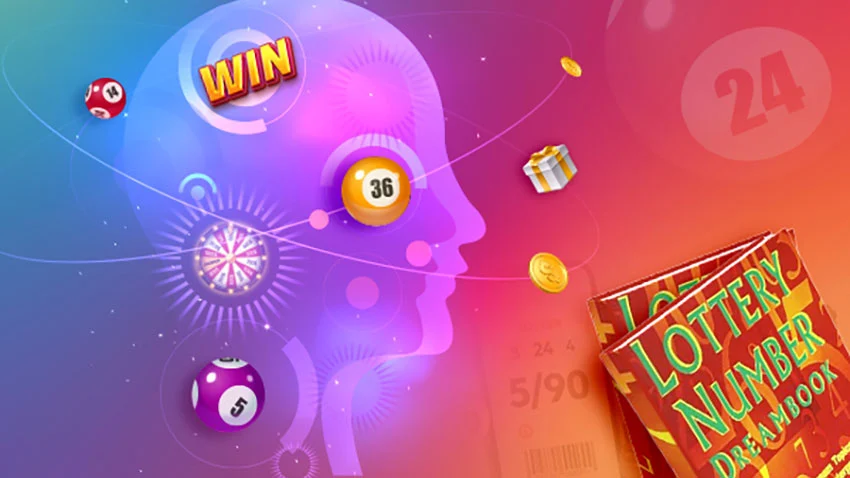
Lottery Illusion
A commonly studied phenomenon in behavioral economics is the "Lottery Illusion", the human proclivity to an overly optimistic outlook on their chances for success of a rare event, such as winning a jackpot. The players do understand the low odds intellectually, but the potential reward feels enticingly real.
Especially for the case of 5/90, this illusion is amplified by the fact that there are multiple draws through the day in specific regions, which keep reinforcing the idea that "next one could be it". Additionally, since it is a low-investment game, players find it to be harmless entertainment. They tend to believe, "What if this small stake changes my life forever?" This routine is bolstered by occasional successes within the community, making the dream seem more accessible.
The African Dreams
Far from being just a gambling activity, 5/90 is a shared tradition and a daily ritual for millions. In Africa, 5/90 is a part of everyday life, from markets to mobile phones; it fosters intergenerational bonding with elders passing on strategies and beliefs to their children.
Many players also associate numbers with dreams, omens, and spiritual signs, hence also making dream interpretation crucial in selecting lottery numbers. Players often consult dream books or "key books," which assign numerical values to animals, objects, or events seen in dreams. This blending of mysticism with modern gaming makes the lottery feel both spiritual and personal. The emotional investment is immense, and players often believe their dream-given numbers are divinely ordained.
Social Reinforcement and Community Rituals
The communal nature of 5/90 adds another psychological layer, bringing people together at kiosks, markets, and neighborhood spots to discuss predictions and results. It's played across generations, with older players relying on traditional methods and younger ones using mobile apps and online forums.
There's also a social identity factor; being a 5/90 player can carry a badge of belonging. People talk about their numbers, their losses, and most importantly, the wins that inspire belief across generations. Despite religious conservatism in many areas, beliefs in luck and divine intervention coexist with lottery play, with many participants praying, fasting, or consulting spiritual advisors before placing their bets.
Most importantly, 5/90 represents hope and aspiration for those facing economic challenges. Even small winnings can make a big difference in someone's life, and the possibility of a life-changing jackpot keeps people engaged. While the game has critics who warn of addiction and misplaced faith, its cultural entrenchment makes it more accepted than other forms of gambling. For many Africans, the 5/90 lottery is not just a game; it's a part of daily life, belief systems, and community identity.
Dopamine and Anticipation
Anticipation tends to release dopamine, which is the brain's feel-good chemical. 5/90 being a game of chance makes players experience a rush of anticipation between choosing their numbers and the draw, which mimics the thrill of other reward-driven forms of behavior.
This "near-win" phenomenon also plays a role. When a player matches 3 or 4 numbers, they often feel they were "so close", which drives further participation. This sense of almost winning keeps hope alive and behavior repeated.
In essence, the 5/90 lottery is not merely a numbers game but a psychological experience. It offers a sense of control (picking your numbers), a touch of fate (from dreams or signs), and the social bonding of shared anticipation. These emotional and cognitive factors, layered over the simplicity of the game, make 5/90 a deeply compelling lottery experience unlike any other.
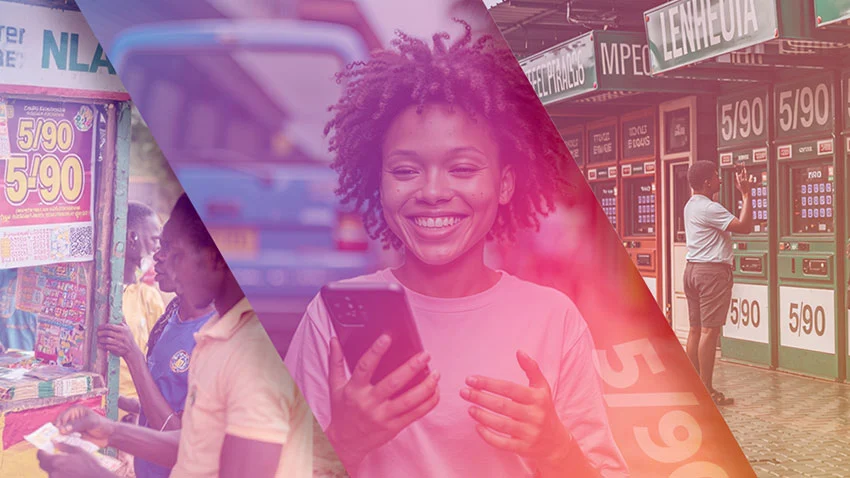
Digital Evolution: The Rise of Online and Mobile 5/90
Technological Advancements and Evolution
As mobile technology reshaped daily life across Africa, it also transformed the way people engage with lottery games, particularly the 5/90 format. Once limited to kiosks and printed tickets, the 5/90 lottery has undergone a dramatic digital evolution, expanding its reach and appeal.
From Manual to Digital Draws
Initially, 5/90 draws were conducted mechanically in full public view. These events were broadcast live on television and radio to ensure transparency. In recent years, as digital tools have matured, many national and private operators have transitioned to computerized random number generators (RNGs), offering faster and more secure draw systems.
Today, a vast number of leading providers use auditable, certified RNG technologies, often tested by international gaming labs. This transition has added credibility to the game while also improving logistics and reducing the risk of human error or fraud.
Mobile Money Integration
One of the biggest catalysts for 5/90's growth has been mobile money platforms like M-Pesa. Services like these have enabled players to buy tickets digitally, receive winnings directly to mobile wallets, and play instantly without needing to visit physical vendors.
This not only increased participation across urban and rural areas but also made the game more inclusive, particularly for those without access to traditional systems.
Online Portals and Apps
Private operators like Baba Ijebu (Nigeria) and government entities such as NLA Ghana launched mobile apps and online portals, allowing 24/7 access to 5/90 draws. These platforms offer live results tracking, instant ticket generation, number trend analytics, and responsible gaming features (like limits and self-exclusion). Some apps even let players "auto-select" lucky numbers based on past draw trends, gamifying the experience further and appealing to younger digital-first demographics.
The 5/90 lottery has not remained static. Over the past decade, the game has undergone a significant transformation driven by technological advancements.
Economic and Social Impact
Beyond entertainment, the 5/90 lottery game has had profound effects on national economies and local communities, both positive and cautionary.
Revenue Generation for Governments
In countries such as Ghana, the National Lottery Authority (NLA) significantly contributes to the state revenue. These funds are used to support education, health initiatives & services, youth employment initiatives, and much more. Reports also show that lotteries contribute millions of cedis annually to the national budget.
Additionally, privately operated 5/90 platforms also pay taxes, licensing fees, and contribute to the broader GDP through employment and vendor networks.
Job Creation
From ticket sellers to mobile app developers and RNG system technicians, the 5/90 ecosystem supports thousands of jobs. In rural areas, kiosk vendors often rely on lottery sales as a primary source of income, creating micro-entrepreneurship opportunities.
Corporate Social Responsibility
Some lottery agencies run corporate social responsibility (CSR) initiatives that fund school renovations, scholarship programs, and community sanitation projects. Similarly, operators have also supported football tournaments, youth empowerment workshops, and charitable causes.
Risks and Responsible Gaming
The game's widespread popularity also comes with the risks of:
- Gambling addiction, especially among low-income groups
- Unlicensed operators, who avoid regulation and may exploit players
- Youth exposure despite age restrictions, underage play remains a challenge
Regulatory bodies have, however, responded to this by introducing awareness campaigns, setting stake limits, and incorporating self-exclusion tools into digital platforms.
5/90 Today: Conclusion
Even though there is an emergence in new digital gaming options, the 5/90 lottery game continues to prosper. Over the generations, it has evolved from a traditional street-side activity into a high-tech product that supports economies, entertains millions, and preserves a cultural narrative of luck, belief, and perseverance. It has become a reflection of the hopes, cultures, and economic aspirations of the people who play it.
Spanning cities and villages, smartphones and betting slips continue to carry dreams of a better tomorrow for millions of people. Whether played using mobile apps or from roadside kiosks, 5/90 remains a symbol of aspiration, a modern legacy rooted in tradition.
If this deep dive into the world of 5/90 has sparked your curiosity or inspired new ideas, let's turn that spark into action. Reach out to Skilrock Technologies at marketing@skilrock.com to access our MGA-approved suite of games, which are battle-tested across Africa, including the renowned 5/90 Lottery.


 English
English

 Spanish
Spanish
 Portuguese
Portuguese


